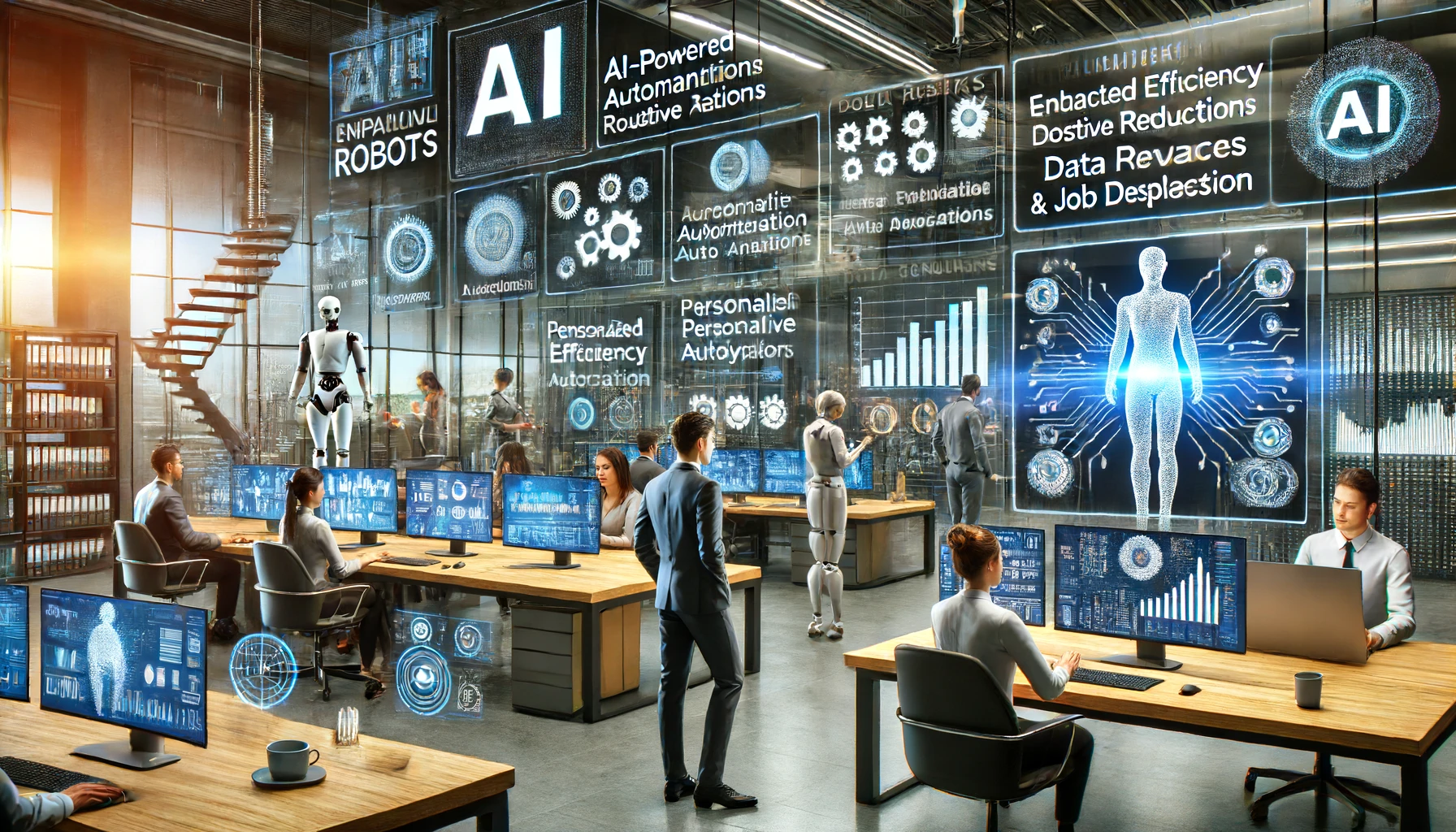Artificial Intelligence (AI) is swiftly altering the domain of corporate procedures. Through the mechanization of monotonous duties, augmenting the process of making choices, and facilitating novel corporate strategies, AI offers a plethora of prospects for enterprises in diverse sectors. Nevertheless, these prospects are accompanied by substantial perils that necessitate prudent management. This discourse delves into the complex repercussions of AI on corporate procedures, accentuating both the promising advantages and the accompanying obstacles.
Prospects of AI in Corporate Procedures
1. Mechanization of Monotonous Duties
- Boost in Productivity
AI solutions like machine learning and robotic process automation (RPA) can execute repetitive actions with greater efficiency than human counterparts. Such mechanization leads to heightened productivity and liberates staff to engage in more strategic endeavors.
- Diminution in Expenses
Through the mechanization of regular activities, corporations can diminish operational expenses. For instance, dialogue bots can manage queries from customers, reducing the necessity for extensive customer service departments.
- Precision and Uniformity
AI mechanisms can carry out tasks with considerable precision and uniformity, reducing the likelihood of errors that might arise in manual operations. This dependability is vital in areas such as finance and healthcare, where inaccuracies can lead to grave repercussions.
2. Ameliorated Decision-Making
- Insights Based on Data
AI is capable of scrutinizing large datasets to detect patterns and insights that might elude human analysis. These insights empower businesses to make choices informed by up-to-the-minute data.
- Predictive Analysis
AI-driven predictive analysis can anticipate future patterns and results, aiding organizations in strategic planning. Retailers, for example, can employ predictive analysis for inventory management and demand forecasting.
- Customization
AI enables corporations to tailor experiences for clients by examining their preferences and actions. Such customization can amplify customer satisfaction and fidelity.
3. Creativity and Fresh Corporate Strategies
- Innovation in Products and Services
AI accelerates innovation by fostering the creation of new offerings. AI algorithms, for instance, can concoct novel drug compounds in the pharmaceutical sector or custom fashion articles in the retail sphere.
- Supply Chain Management Enhancement
AI can refine supply chain processes by forecasting demand, orchestrating inventory, and pinpointing possible disruptions. Such enhancements can lead to cost reductions and elevated service standards.
- Customer Interaction Improvement
Technologies like natural language processing (NLP) and computer vision provided by AI can improve client interactions. AI, for instance, can scrutinize customer feedback to refine product quality or offer virtual fitting for online shopping.
Perils and Challenges of AI in Corporate Procedures
1. Data Privacy and Protection
- Data Intrusions
AI mechanisms commonly require access to extensive datasets, which could be targeted by cyberattacks. Securing this data is critical to avert breaches that can tarnish a firm’s reputation and result in legal penalties.
- Privacy Worries
AI utilization incites concerns regarding the privacy of data, particularly concerning personal information. Firms must adhere to complex legal frameworks, like the General Data Protection Regulation (GDPR), to guarantee regulatory adherence.
2. Ethical and Bias Dilemmas
- Algorithmic Prejudice
AI systems may reinforce or even intensify biases found in the data they are trained on. Such prejudices can provoke unjust outcomes in fields such as recruitment, lending, and law enforcement.
- Moral Quandaries
Implementing AI poses moral queries, such as the degree to which choices should be automated and the impact on employment. Corporations must formulate ethical protocols to address these issues.
3. Workforce Consequences
- Job Redundancy
Mechanization may render certain jobs redundant, especially those involving routine tasks. Firms must address this shift by providing training to employees for new roles.
- Transformation Management
Integrating AI into corporate procedures demands significant efforts in managing change. Resistance to new technologies by workers must be countered with adequate training and communication.
4. Implementation Hurdles
- Integration with Preexisting Systems
Merging AI with outdated systems can be intricate and costly. Corporations must assure compatibility of new AI solutions with their current infrastructure.
- Elevated Expenses
Initial investments in AI technologies can be substantial, and it may take time for the returns to be realized. Firms should judiciously evaluate the financial aspects of AI adoption.
5. Regulatory and Compliance Concerns
- Changing Regulations
The regulatory framework for AI is in flux, and corporations must keep abreast of new statutes and regulations. Noncompliance could lead to hefty fines and reputational harm.
- Responsibility Assignment
It can be difficult to assign accountability for decisions made by AI, especially when these systems operate autonomously. Firms must establish explicit frameworks for accountability.
Conclusion
AI harbors the capacity to transform corporate operations through efficiency enhancement, decision improvement, and driving innovation. Nevertheless, the adoption of AI brings forth significant risks that must be judiciously managed. By addressing concerns related to data privacy and security, mitigating biases, managing workforce changes, overcoming implementation barriers, and keeping abreast of regulatory matters, enterprises can leverage AI’s power while mitigating its perils. The shape of future corporate operations will likely hinge on how well businesses can strike a balance between these prospects and challenges.
